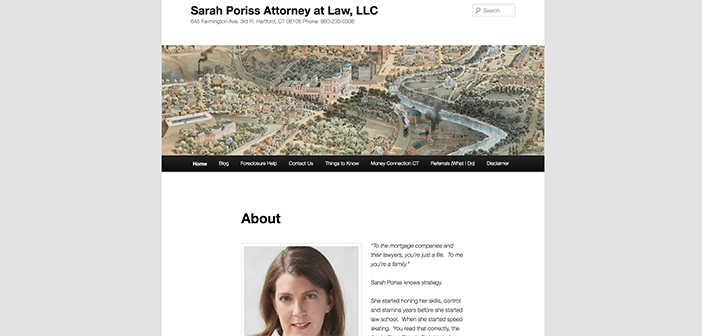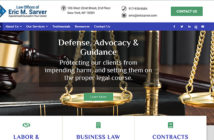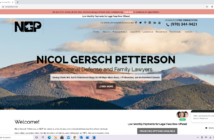Sarah Poriss focuses on the value of the information she provides through multiple channels, and on her persistent networking efforts.
Sarah Poriss, a solo practitioner in Hartford, Connecticut, recently took her clients to a movie. The film, The Big Short, a drama about the financial crisis that was triggered by the collapse of the housing bubble, was an appropriate choice for an attorney who represents consumers faced with mortgage foreclosure proceedings and other money problems. The same financial meltdown had devastated many of her clients.
About a dozen people joined Poriss and her husband for the outing. “It was really fun, and I got some good feedback,” she says. “I got emails from people who said, ‘It was really great, it really made me think, I’m so glad you did that, and it’s really cool that you offered to pay.’ To be honest, I did not pay full price,” Poriss confesses. “It was the six-dollar movie night at my local theater. My husband does not have a head for business but even he could see that it was a great little marketing tool. He said I got way more than $90 worth of goodwill out of it.”
Poriss plans to do it again the next time a suitable film comes along. Movie nights with clients has thus become her latest bright idea in a never-ending search for new ways to provide great customer service. That’s a key part of a solo practitioner’s job, as she sees it. “Lawyers who do not see themselves as being in a customer-service industry are not looking at it the right way, especially solo attorneys who have to deal one-on-one with people. People-facing is my term for it.” She has tried to keep that in mind at all times in the decade since she launched her solo practice, after working for four years at a small consumer-law firm. “I think that has helped me get repeat business and a lot of word-of-mouth referrals from clients,” Poriss says.
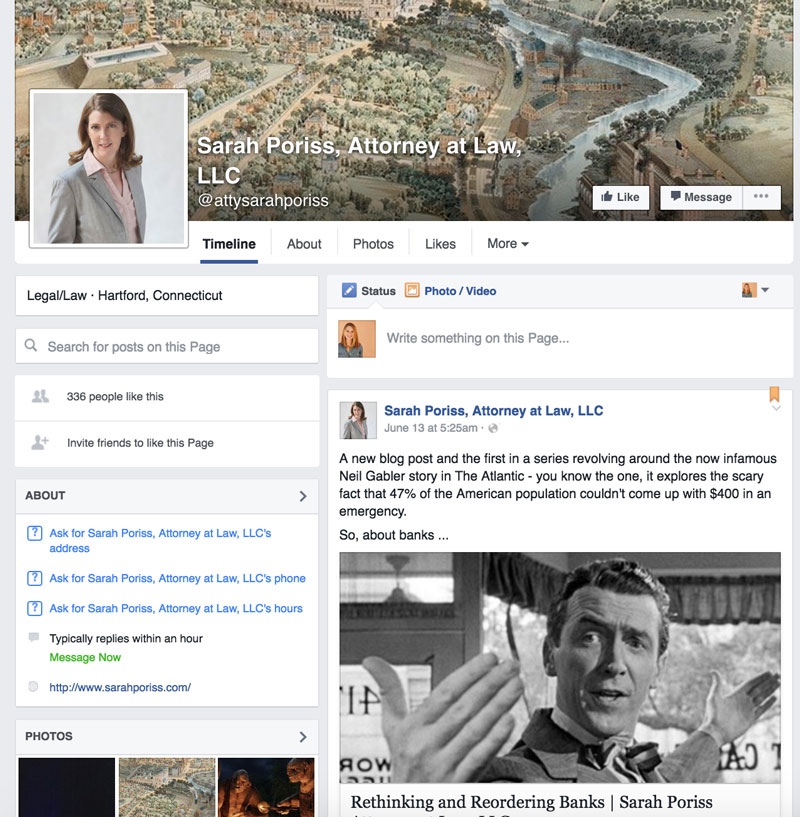
Consistency Is Key to Networking Success
Networking is another marketing strategy that Poriss has used to good effect, with help from Business Networking International, which bills itself as “the world’s leading referral organization.” At regularly scheduled meetings, a moderator gives those in attendance 30 seconds to introduce themselves. “That’s a good way to practice your elevator pitch,” she says. Before the meetings adjourn, attendees exchange small batches of business cards with each other, with the intention of passing them on to anyone they meet who might need the services of another member of the group.
The moderator “makes it clear that we are not there to sell to each other,” she says. A mortgage broker she often sits next to at meetings would not need her services anyway. “But when he comes across someone who wants to refinance their mortgage but they have a problem with their credit, I could help that person, so he sends them to me. And if I have a client who wants to refinance their mortgage, I send them to him. That’s how I have learned to make and use connections.”
There are plenty of other venues where a solo attorney can network. But it takes a concerted effort to make it work, Poriss says. “When you do networking, you should go into it to get people to know you, like you and trust you. To do that, you have to stick with it,” she says. “When you are consistent with networking, you make friends and you get to know people. You are all getting up in the dark and the cold and the rain and the snow and getting to that meeting by 7 a.m. The people who show up on time respect each other because you’re all in the same boat.”
Poriss adds, “I recommend that anyone who starts networking should stay with the same group for six months or a year and then reevaluate. Don’t go twice and say that didn’t work. You have to be persistent. That’s how you get people to know you, like you and trust you–and become known and recognized for what you do.”
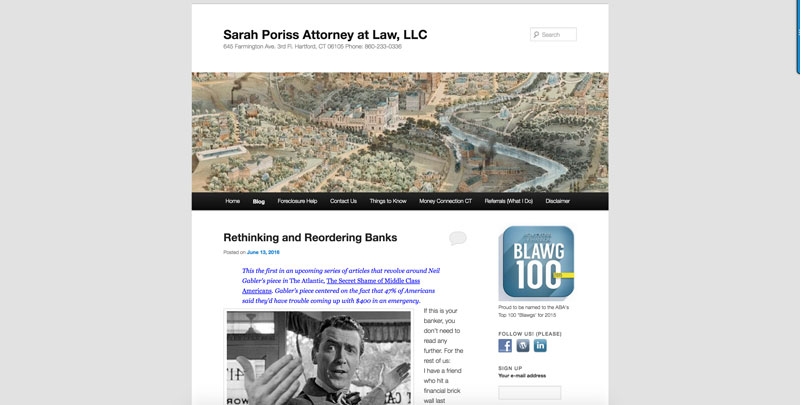
How to Use a Ghost Writer
Poriss has also gained recognition by publishing prolifically, admittedly with a lot of help. “I will confess that I use a writer and a blogger,” she says. Her ghostwriter, a former attorney, generates content for her Facebook page and other social media, as well as for her blog, which was recently commended by the ABA as one of the nation’s top 100 law blogs. He also wrote an op-ed column recently published under her byline in the Hartford Courant about debts incurred online by fans of fantasy sports. “He saw a news story about the issue and said to me, ‘You know, you should write about this, so here’s what you’ve written. Go ahead and submit it to the Hartford Courant.’ I tweaked it a tiny bit,” she says. After the paper published it, Poriss was interviewed about the issue on the local public radio station.
If you’re going to use a writer, she advises, “find someone who understands you not just as a lawyer but as a person.” Her ghostwriter interviewed her at the outset about her likes and dislikes in an effort to get her “cultural temperature,” Poriss says. “It took awhile but he now knows what kind of references are me.” To be sure, he uses a lot of sports references “that I am totally lost on. He will say, ‘Go read your blog because people will ask you about it and you should know what you wrote.’ It’s kind of funny but do you think everybody does their own blogging? You don’t have time!”
Poriss and her blogger confer from time to time about topics to cover that have a marketing hook. One theme they recently came up with–after she shared her frustrations about clients who contact her for help at the last minute–was “don’t wait,” she says. “If you get served with foreclosure papers, don’t wait until it’s so far down the road that it’s a scramble to get help. It’s going to be more expensive, too. We’re pointing out the various angles on that theme, and the more people that reaches, the more it will sink in.”
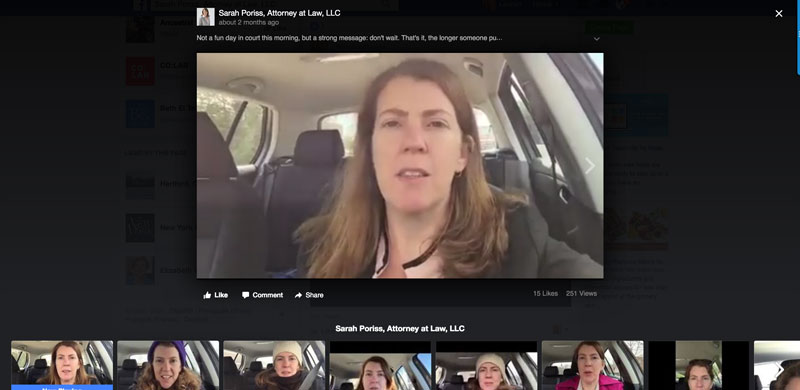
Marketing with Video Clips
That theme is played up in articles on her blog, Facebook posts, and in video clips, a medium that she has just begun to master. “If I have had a particularly interesting hearing, when I leave court, I will turn my phone toward me and I will say, ‘Hey, I just got out of a long morning in court and the lesson is, if you want to save your home, don’t wait. If you’re in a mortgage foreclosure, a lot of stuff can happen if you’re too late.’ Done in 30 or 40 seconds. I e-mail it to my writer, he posts it and boosts it. Before when I posted things, I was getting 50 views or maybe 90 views. Now I am posting things that get 1,800 or 2,000 views on these little videos. I don’t know who is watching, but I hope it sinks in.”
Poriss has recently expanded her video outreach to clients and prospective clients with a series of videos that she calls Your Money Connection. Using Skype, she interviews experts on topics ranging from credit reports and reverse mortgages to college savings plans and car leases, and posts them on her website. Visitors can get free access to the interviews simply by signing in with their email addresses.
“I produce those myself with software that records the videos, so they’re low-res with low production values. I am standing in my office. The lighting is not very good, and sometimes I don’t even have makeup on. Sometimes my interview subjects look terrible. But it’s not about looking impressive, and it’s not about me. It’s really all about the information,” says Poriss.
The Your Money Connection series is also about building a list of prospective clients. “When people login and start watching videos, I have their email addresses and now I can start sending them a newsletter or consumer tips periodically. If I could get one client per month, or two or three clients a month, because they saw an interview, I could make thousands and thousands of dollars a year off of that,” she says.

Perils of Perfectionism
The fact that they’re not particularly polished doesn’t concern Poriss. “Perfectionism could prevent you from doing anything,” she says. “I think that’s the plight of the solo attorney. ‘Oh, I can’t start a blog because what if I make a typo.’ So don’t blog, and don’t get named to the ABA’s top 100 law blogs and don’t get interviewed on radio and TV–all because you’re worried about a typo?”
Many attorneys are also wary of marketing themselves because they’re afraid someone will file an ethics complaint against them with the state bar. “So what are you going to do? Sit in your little office and not make any money because you’re worried that some random crazy person will grieve you?”
“You just have to move forward and if something works, go with it, and if it doesn’t, change course. I am not going to let perfectionism hold me back. That’s why those videos look the way they do. I am not going to wait until I am in a studio with perfect lighting and high-definition video to get my information out there. My demographic is the average person and they don’t care,” says Poriss. Consumers in financial straits can benefit from the information, and that’s why she wants to disseminate it, Porris says.
The sentiment is not entirely magnanimous. “The philosophy of Business Networking International is that people who give will gain,” Poriss explains. “I am giving all of this free information and at some point, in some form, it will come back to me.”

